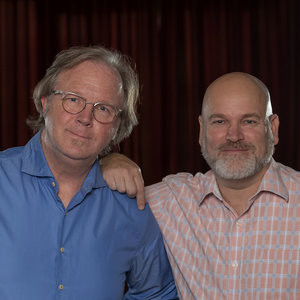
Stories, science and secrets from the world’s brightest thought-leaders. Behavioral Grooves is the podcast that satisfies your curiosity of why we do what we do. Explanations of human behavior that will improve your relationships, your wellbeing, and your organization by helping you find your groove.
Episodes

Sunday Oct 31, 2021
Halloween Special: Grooving on Scary Biases
Sunday Oct 31, 2021
Sunday Oct 31, 2021
Listen to Kurt and Tim’s spooky Halloween Special about some common biases that can seem a bit scary. But don’t fear, the scariest thing about this episode is actually Kurt and Tim’s jokes! Find out why some biases are a bit spooky, what makes us susceptible to them, and most importantly how we can overcome them.
Thanks for taking the time to learn a bit about how to overcome the biases you may find impacting your life. If you’d like to support our work further, please consider donating a treat (no tricks please!) on our Patreon page: https://www.patreon.com/behavioralgrooves. Your financial support helps with all our production costs.
Links
Behavioral Grooves Twitter: @behavioralgroov
Kurt Nelson Twitter: @motivationguru
Tim Houlihan Twitter: @thoulihan
Common Biases and Heuristics: https://docs.google.com/document/d/1XHpBr0VFcaT8wIUpr-9zMIb79dFMgOVFRxIZRybiftI/edit
Scary Biases: https://blog.lanterngroup.com/scary-biases
Behavioral Grooves Patreon page: https://www.patreon.com/behavioralgrooves

Wednesday Oct 27, 2021
Why Does Rude Behavior Really Bother Us So Much? | Trevor Foulk PhD
Wednesday Oct 27, 2021
Wednesday Oct 27, 2021
Rudeness is contagious, in a similar way to a virus. When experiencing a rude encounter, our brain perceives it like a threat. And once we’ve tuned in to this low-level threat, we’re more likely to notice it around us, and therefore more likely to display rude behavior ourselves.
Our guest on this episode is Dr Trevor Foulk PhD, Assistant Professor of Management & Organization at the University of Maryland. His well published research on deviant workplace behaviors and workplace power dynamics, has been featured in Time magazine, Harvard Business Review, and the Wall Street Journal.
Trevor walks us through what rude behavior actually is, what our evolutionary response to it is and how we can take steps to mitigate the effects of it. We are also delighted to talk about Trevor’s research around the way power changes our behavior, and what impact a feeling of paranoia can add to the dynamics. And to Tim’s delight, Trevor also boosts our understanding of how music affects work performance.
Truth be told, our conversation with Trevor has opened our eyes into how rude behavior really impacts people. And in our Grooving Session, at the end of the episode, Kurt and Tim recap the ways Trevor’s research can improve our lives.
If you enjoy listening to our podcast, you can become an exclusive Behavioral Grooves Patreon member at https://www.patreon.com/behavioralgrooves.
Topics
(3:28) Welcome and speed round
(8:38) How rudeness is contagious.
(11:45) Why do we view rudeness as threatening?
(13:10) The solutions to rudeness.
(15:36) How our response to rudeness differs from holding a grudge.
(17:52) Are certain personality types more susceptible to rudeness?
(19:15) What effect does rudeness have on medical professionals?
(22:59) Can gratitude have the opposite effect to rudeness?
(24:27) How the Anchoring Effect is affected by rudeness.
(28:43) How does a feeling of power change our behavior?
(35:40) Paranoia and power.
(39:51) How does music influence performance?
(47:35) Grooving Session with Kurt and Tim discussing what we’ve learnt from Trevor’s interview.
© 2021 Behavioral Grooves
Links
Dr Trevor Foulk PhD: https://www.rhsmith.umd.edu/directory/trevor-foulk
Foulk, T.A., Woolum, A., & Erez, A. (2016). Catching rudeness is like catching a cold: The contagion effects of low-intensity negative behaviors. Journal of Applied Psychology: https://www.courts.state.co.us/userfiles/file/Administration/Probation/ResearchInBriefs/RIB_Rudeness_Apr16(1).pdf
Riskin, A. Erez, A., Foulk, T.A., Kugelman, A., Gover, A., Shoris, I, Riskin, K., & Bamberger, P.A. (2015). The impact of rudeness on medical team performance: A randomized trial. Pediatrics: https://pubmed.ncbi.nlm.nih.gov/26260718/
Foulk, T.A., Lanaj, K., Tu, M., Erez, A., & Archambeau, L. (2018) Heavy is the head that wears the crown: An ator-centric approach to psychological power, abusive behavior, and perceived incivility. Academy of Management Journal: https://journals.aom.org/doi/10.5465/amj.2015.1061
John Bargh: Episode 155. Dante, Coffee and the Unconscious Mind: https://behavioralgrooves.com/episode/john-bargh-dante-coffee-and-the-unconscious-mind/
John Bargh, Episode 248. Do We Control Situations or Do Situations Control Us? https://behavioralgrooves.com/episode/control-situations-with-john-bargh/
Vanessa Bohns, Episode 253. Why You Don‘t Need to be Powerful to be Influential: https://behavioralgrooves.com/episode/influence-vanessa-bohns/
Musical Links
Lyle Lovett and Robert Earl Keen “This Old Porch”: https://www.youtube.com/watch?v=H1xY2pu31h4
Jim Croce “Operator”: https://www.youtube.com/watch?v=rw01trwmul0
Rancid “Fall Back Down”: https://www.youtube.com/watch?v=CinJuVtdp3Y
Jimmy Buffett “Margaritaville”: https://www.youtube.com/watch?v=z3HBcgxOWAQ

Sunday Oct 24, 2021
Helping People To Assemble Better Decisions | Eric J. Johnson
Sunday Oct 24, 2021
Sunday Oct 24, 2021
How do we make decisions? What factors influence the final outcome? Do default settings change our preferences? Every decision we make; from choosing something on a menu to deciding whether to be an organ donor, is influenced by our environmental context and the default selections presented to us.
Professor Eric J. Johnson has distilled the latest behavioral science research into his newest book, The Elements of Choice: Why the Way We Decide Matters, and we are thrilled to talk with him about it on this episode of Behavioral Grooves.
Eric is Director of the Center for Decision Sciences at Columbia Business School at Columbia University. He examines the interaction between Behavioral Decision Research, Economics and consumer decision making. The implications of his research come together in real world applications such as public policy and marketing.
Eric talks with us about how options are presented to decision-makers and how framing affects choices. Our decisions are “assembled”, as Eric likes to put it, in the moment and are not necessarily pre-determined by our preferences. Choice architects have very influential power over decision-makers but Eric highlights to us that we are all designers, and with that comes a moral responsibility.
Topics
(3:56) How Leading Human™ can help with returning to the office.
(6:28) Welcome and speed round.
(8:00) How interference affects our decision making.
(10:32) The controversy of organ donation defaults.
(16:32) We are all designers using the tools of choice architecture.
(19:21) How sludge impacts our decision making.
(22:42) How context influences defaults.
(26:14) What factors moderate the impact of default settings?
(29:01) Making choices in the real world vs. classic economic thinking.
(32:18) The effects of asking people how long they will live vs. what year they expect to die.
(35:04) Smart defaults: defaults set specifically for you.
(38:02) What is Query Theory?
(39:15) Choice architecture around vaccinations.
(42:44) What area does Eric want to research in the future?
(44:44) What music does Eric default to?
(52:24) Grooving Session with Kurt and Tim on how to apply Eric’s research to our lives.
© 2021 Behavioral Grooves
Links
Behavioral Grooves Patreon: www.patreon.com/behavioralgrooves
Leading Human™ Workbook and Playbook: https://www.behavioralgrooves-store.com/products/copy-of-the-leading-human-playbook-workbook-package
Leading Human™, Free Whitepaper Download: https://www.behavioralgrooves-store.com/collections/leading-human/products/human-centered-workplace-checklist
Leading Human™ Workshop on Dec 14th, 2021 (more dates to be added soon): https://www.behavioralgrooves-store.com/collections/leading-human/products/leading-human-workshop
Promo Code: GROOVERS to receive $20 off (limited time offer for listeners).
“The Elements of Choice: Why the Way We Decide Matters” by Eric J. Johnson: https://amzn.to/39yXr20
"Do Defaults Save Lives?" by Johnson, Eric, and Daniel Goldstein. Science 302 (2003): https://www8.gsb.columbia.edu/researcharchive/articles/1275
“Sludge: What Stops Us from Getting Things Done and What to Do about It” by Cass Sunstein: https://amzn.to/3i1lLhD
Tim Kachuriak, Episode 221: Donating Our Money Is Irrational, So Why Do We Do It? Tim Kachuriak Explains Our Motivations: https://behavioralgrooves.com/episode/why-we-donate-our-money/
“Time to Retire: Why Americans Claim Benefits Early and How to Encourage Them to Delay” In Behavioral Science and Policy (2015). Coauthor(s): Kirstin Appelt, Melissa Knoll, Eric Johnson, Jonathan Westfall: https://behavioralpolicy.org/articles/time-to-retire-why-americans-claim-benefits-early-how-to-encourage-delay/
Musical Links
Eric Dolphy “Out to Lunch!”: https://www.youtube.com/watch?v=Ne6GCYO8pAc
Django Reinhardt “Three-Fingered Lightning”: https://www.youtube.com/watch?v=PQhTpgicdx4
David Grisman Quartet “Dawg Funk”: https://www.youtube.com/watch?v=9P-FQ7xLiso
Jerry Garcia “How Sweet It Is To Be Loved By You”: https://www.youtube.com/watch?v=1_NOFuEb-yo&ab_channel=JerryGarcia
Beethoven: https://www.youtube.com/watch?v=W-fFHeTX70Q
Caroline Shaw & Sō Percussion “Let The Soil Play a Simple Part”: https://www.youtube.com/watch?v=-cHc4n5mgNM&ab_channel=NonesuchRecords
George E. Lewis “Mind In Flux” at the BBC Proms 2021: https://www.youtube.com/watch?v=CSvwisQ3la4
Bruce Springsteen “Tougher Than The Rest”: https://www.youtube.com/watch?v=_91hNV6vuBY

Sunday Oct 17, 2021
Anxiety at Work: Why We Feel It and How To Manage It | Chester Elton
Sunday Oct 17, 2021
Sunday Oct 17, 2021
Anxiety in the workplace has always been present, even pre-pandemic but rates of anxiety, particularly among young employees, have worsened since 2020. So what obligation do organizations have to their employees' mental health? How can managers recognize the signs of anxiety, and how can we help our colleagues with those feelings?
Following our incredibly popular first episode with Chester Elton in July 2021, on showing gratitude (episode 238), we are thrilled to be talking with him again about anxiety in the workplace. As a best-selling author, speaker and executive coach, Chester, and his co-author Adrian have shown over and over again, that the key to really successful companies is really successful relationships with employees. And because of the pandemic, we wanted to talk with Chester about their most recent book; Anxiety at Work: 8 Strategies to Help Teams Build Resilience, Handle Uncertainty, and Get Stuff Done: https://amzn.to/3dr7gBK.
Thank you to all of you who have subscribed to our show, written a review or shared an episode with your friends. Please also consider donating a small amount each month to our work, through our Patreon site: https://www.patreon.com/behavioralgrooves.
© 2021 Behavioral Grooves
Topics
(3:03) Speed round questions.
(5:30) Is anxiety in the workplace increasing or decreasing?
(10:11) How to manage with empathy, not just sympathy.
(14:59) Unleashing employees' potential.
(20:17) The number one cause of anxiety and how managers can recognize it.
(23:34) Showing vulnerability as a manager.
(29:12) Will people take advantage of mental health days off?
(32:07) How to deal with your own perfectionism and anxiety.
(36:57) The ways you can join Chester’s community.
(40:22) Chester’s anti-anxiety playlist.
(44:05) Chester’s kind promise to listeners.
(45:00) Grooving Session discussing how to apply Chester’s insight to our lives.
Books by Chester Elton and Adrian Gostick
Anxiety at Work: 8 Strategies to Help Teams Build Resilience, Handle Uncertainty, and Get Stuff Done: https://amzn.to/3dr7gBK
Leading with Gratitude: Eight Leadership Practices for Extraordinary Business Results: https://amzn.to/36Cy8uo
All In: How the Best Managers Create a Culture of Belief and Drive Big Results: https://amzn.to/3AgtSyk
The Best Team Wins: The New Science of High Performance: https://amzn.to/2USP4KN
The Orange Revolution: How One Great Team Can Transform an Entire Organization: https://amzn.to/3ybULSb
Links
Behavioral Grooves Patreon: www.patreon.com/behavioralgrooves
Chester Elton: www.chesterelton.com
Chester Elton, Episode 238: Who Makes You Feel Grateful? Tell Them! https://behavioralgrooves.com/episode/gratitude-with-chester-elton/
We Thrive Together: www.wethrivetogether.global. A safe community to talk about anxiety and stress with over 500 members.
Anxiety at Work with Adrian Gostick & Chester Elton: https://podcasts.apple.com/gb/podcast/anxiety-at-work-with-adrian-gostick-chester-elton/id1549312484
“The Boy, the Mole, the Fox and the Horse” by Charlie Mackesy: https://amzn.to/2YxRO2d
Nicole Malachowski: https://bit.ly/3oCYTt5
HR Leaders Podcast with Chris Rainey: https://hrleaders.co/podcast
Seth Stephens-Davidowitz, Episode 246: Are You More Honest with Google or Your Friends? https://behavioralgrooves.com/episode/are-you-more-honest-with-google/
“The Heart of Business: Leadership Principles for the Next Era of Capitalism” by Hubert Joly: https://amzn.to/2YmaMZt
Garry Ridge at WD-40: https://wd40company.com/our-tribe/our-tribes-leaders/
Musical Links
Pharrell Williams “Happy”: https://www.youtube.com/watch?v=ZbZSe6N_BXs
Monty Python, Eric Idle “Always Look on the Bright Side of Life”: https://www.youtube.com/watch?v=SJUhlRoBL8M
The Beatles “Good Day Sunshine”: https://www.youtube.com/watch?v=6e01nNA02vw
The Beatles “Fixing A Hole”: https://www.youtube.com/watch?v=UPBd8eHQqIw

Sunday Oct 10, 2021
The 5 Healthy Brain Habits Of A Neuroscientist | Dr Daniel Almeida
Sunday Oct 10, 2021
Sunday Oct 10, 2021
What life habits keep our brain healthy? How does our mind respond to trauma? And why does the way we talk about suicide and mental health make such a difference to those who are struggling? We discuss all these topics with neuroscience researcher Dr Daniel Almeida.
To mark World Mental Health Day on Sunday, Oct 10, 2021, we decided to delve into the science behind mental health. And who better to help us with this topic than Daniel who has been named as one of Forbes 30 under 30 in science. His incredible work as a neuroscience researcher in the Douglas Research Centre at McGill University in Montreal, Canada, involves psychological autopsies to understand the molecular impacts of severe childhood abuse on the brains of individuals who died by suicide.
As you can imagine, this episode is full of difficult yet important topics. But what struck us most about Daniel was how upbeat and positive he is about his work and the difference it’s making to people’s lives. Daniel kindly shares his top 5 healthy brain habits that we can all adopt to improve our mental wellbeing.
If you, or someone you know needs help with their mental health, please use one of the resources in the links below.
Mental Health Support
Suicide Prevention Lifeline (US):https://suicidepreventionlifeline.org/
American Foundation for Suicide Prevention: https://afsp.org/suicide-prevention-resources
Substance Abuse and Mental Health Services Administration: National Helpline (US): 1-800-662-HELP (4357). SAMHSA’s National Helpline is a free, confidential, 24/7, 365-day-a-year treatment referral and information service (in English and Spanish) for individuals and families facing mental and/or substance use disorders. https://www.samhsa.gov/find-help/national-helpline
The Canada Suicide Prevention Service: https://www.crisisservicescanada.ca/en/
Samaritans (UK): https://www.samaritans.org/
United for Global Mental Health (List of support networks around the world): https://unitedgmh.org/mental-health-support
Topics
(6:29) Speed round.
(10:14) Does talking about suicide help?
(14:15) Why it’s very important to talk about “dying by suicide” instead of “committing suicide”.
(16:17) About Daniel’s work as a neuroscientist.
(17:47) What are the links between childhood trauma and suicide?
(25:16) What age are children most sensitive to the effects of trauma?
(31:19) How the type of trauma experienced by a child matters.
(33:36) How resilience is more like a sword than a shield.
(35:29) What are the 5 best brain health habits?
(41:57) What is a brain bank and how are psychological autopsies used?
(44:30) What music isn’t noise pollution for Daniel?
(46:24) Music and the brain.
(48:13) Grooving Session with Kurt and Tim; how to apply Daniel’s work to your life.
© 2021 Behavioral Grooves
Links
World Mental Health Day: https://www.who.int/campaigns/world-mental-health-day
Leading Human™ Workbook and Playbook: https://www.behavioralgrooves-store.com/products/copy-of-the-leading-human-playbook-workbook-package
Leading Human™, Free Whitepaper Download: https://www.behavioralgrooves-store.com/collections/leading-human/products/human-centered-workplace-checklist
Leading Human™ Workshop on Dec 14th, 2021 (more dates to be added soon): https://www.behavioralgrooves-store.com/collections/leading-human/products/leading-human-workshop
Promo Code: GROOVERS to receive $20 off (limited time offer for listeners).
Episode 220: How Do You Become Influential? Jon Levy Reveals His Surprising Secrets: https://behavioralgrooves.com/episode/how-to-be-influential-jon-levy/
Dr Brenda Mildner – Mother of Psychological worked on bilateral hypocantim removal: https://www.mcgill.ca/neuro/about/brenda-milner
Donald Hebb: https://can-acn.org/donald-olding-hebb/#:~:text=Donald%20Hebb%20(1904%2D1985),which%20was%20published%20in%201949.
“Molecular impacts of childhood abuse on the human brain” Ibrahim, P.; Almeida, D.; Nagy, C.; Turecki, G. (2021): https://www.sciencedirect.com/science/article/pii/S2352289521000515?via%3Dihub
“A Slice of the Suicidal Brain: What Have Postmortem Molecular Studies Taught Us?” Almeida, D. and Turecki, G. (2016): https://pubmed.ncbi.nlm.nih.gov/27671915/
“What Happened to You?: Conversations on Trauma, Resilience, and Healing”, by Oprah Winfrey and Bruce Perry: https://amzn.to/3lF7EQ7
Brain structure of dancers and musicians https://www.falishakarpati.com/bio
Support Behavioral Grooves by donating on Patreon: https://www.patreon.com/behavioralgrooves
Musical Links
Gladys Knight & The Pips “Midnight Train to Georgia”: https://www.youtube.com/watch?v=A0F9lh8TiSM&ab_channel=GladysKnightTPVEVO
Whitney Houston “I Will Always Love You”: https://www.youtube.com/watch?v=3JWTaaS7LdU
The Supremes “Where Did Our Love Go”: https://www.youtube.com/watch?v=qTBmgAOO0Nw
Stevie Wonder “As”: https://www.youtube.com/watch?v=GYQfWJNWe3I
Marconi Union - Weightless Playlist: https://www.youtube.com/watch?v=qYnA9wWFHLI&t=6831s

Sunday Oct 03, 2021
Money Does Boost Happiness, But Not The Way We Think It Does | Daniel Crosby
Sunday Oct 03, 2021
Sunday Oct 03, 2021
The clearest indicators of our financial solvency are based on the behaviors we exhibit with our investments. Dr. Daniel Crosby PhD is a psychologist, behavioral finance expert, asset manager and bestselling author of four books including “The Behavioral Investor”: https://amzn.to/3Bl4s3t. We examine with him the question of whether financial success ultimately brings us happiness? Surprisingly it can, but not in the ways that we think it does.
Having studied the growing list of 200 odd behavioral biases and heuristics, Daniel has whittled them down to what he describes as the four “Big Daddy” biases: ego, emotion, attention and conservatism. We learn about why these matter so much and interestingly what Coke Zero can teach us about our biases!
Daniel touches on his other bestselling book “You’re Not That Great”: https://amzn.to/3ifiRFC which refreshingly embraces the fact that we are in fact all fairly average! That self esteem is built not by awarding prizes for participation, but by taking a risk, working hard and acknowledging that occasionally we will fall flat on our face along the way!
In our Grooving Session with Kurt and Tim, following our interview with Daniel we talk about the ways that we can apply Daniel’s insights to improve our wellbeing and our relationships. [Tim quotes the infamous “Man in the Arena '' quote from Theodore Roosevelt but apologies, we incorrectly credited the quote to Eisenhower, not Roosevelt in the episode.]
If you would like to invest in the work that Behavioral Grooves does to bring you interviews like Daniels every week, please support our Patreon page: https://www.patreon.com/behavioralgrooves thank you.
Topics
(3:09) Welcome and speed round.
(5:51) Why understanding people is vital to understanding markets.
(8:20) Daniel's journey into behavioral finance.
(11:02) What behavioral finance can help with beyond your bank balance.
(15:17) Can money really boost our happiness?
(20:05) The benefits of embracing our mediocrity.
(24:30) How stress impacts performance.
(26:58) Meta-biases: ego, promotion, attention, conservatism.
(31:09) What Coke Zero can teach us about conservatism bias.
(36:51) Ethics and behavioral finance.
(41:09) What music does Daniel invest in?
(48:44) Grooving Session on how to apply Daniel’s work in our own lives.
© 2021 Behavioral Grooves
Books by Daniel Crosby
The Laws of Wealth: Psychology and the secret to investing success: https://amzn.to/36NsbuJ
The Behavioral Investor: https://amzn.to/3Bl4s3t
You're Not That Great: https://amzn.to/3ifiRFC
Personal Benchmark: Integrating Behavioral Finance and Investment Management https://amzn.to/3h5TjM1
Links
Van Leeuwen Ice Cream Honeycomb: https://vanleeuwenicecream.com/
“Subjective Well-Being and Income: Is There Any Evidence Of Satiation?” Betsy Stevenson and Justin Wolfers (2013): https://www.brookings.edu/wp-content/uploads/2016/06/subjective-well-being-income.pdf
“The Psychology of Money: Timeless lessons on wealth, greed, and happiness” by Morgan Housel: https://amzn.to/3onc5C2
Daniel Crosby TEDx: https://www.youtube.com/watch?v=dXUh3wNnFrw
“Nudge: The Final Edition” by Richard Thaler and Cass Sunstein: https://amzn.to/2ZqQn5O
Barry Ritholtz, Episode 47. How to Reduce Evolutionary Panic: https://behavioralgrooves.com/episode/barry-ritholtz-reducing-panic/
The Rocket City Trash Pandas: https://www.milb.com/rocket-city
“Sludge: What Stops Us from Getting Things Done and What to Do about It” by Cass Sunstein: https://amzn.to/3CNQJ4X
At Uber, a New C.E.O Shifts Gears, The New Yorker: https://www.newyorker.com/magazine/2018/04/09/at-uber-a-new-ceo-shifts-gears
Trevor Foulk episode (publishing at the end of Oct 2021)
Seth Stephens-Davidowitz, Episode 246. Are You More Honest with Google or Your Friends? https://behavioralgrooves.com/episode/are-you-more-honest-with-google/
Vanessa Bohns, Episode 253. Why You Don‘t Need to be Powerful to be Influential: https://behavioralgrooves.com/episode/influence-vanessa-bohns/
Ben Parr, Episode 237. Attention: How to Capture It and Keep It with Ben Parr: https://behavioralgrooves.com/episode/attention-with-ben-parr/
Musical Links
Phoebe Bridgers “Kyoto”: https://www.youtube.com/watch?v=Tw0zYd0eIlk
Elliot Smith “Angeles”: https://www.youtube.com/watch?v=FMSU4QDbdew&ab_channel=lucilwinchester
Radiohead “Creep”: https://www.youtube.com/watch?v=XFkzRNyygfk&ab_channel=Radiohead
Arcade Fire “The Suburbs”: https://www.youtube.com/watch?v=5Euj9f3gdyM&ab_channel=ArcadeFireVEVO
Father John Misty “Real Love Baby”: https://www.youtube.com/watch?v=IOspC5B69L4&ab_channel=SubPop
Vampire Weekend “This Life”: https://www.youtube.com/watch?v=FwkrrU2WYKg&ab_channel=VampireWeekendVEVO
Run The Jewels “Legend Has It”: https://www.youtube.com/watch?v=vWaljXUiCaE&ab_channel=RunTheJewels

Sunday Sep 26, 2021
Why You Don‘t Need to be Powerful to be Influential | Vanessa Bohns
Sunday Sep 26, 2021
Sunday Sep 26, 2021
To be influential you do not require power, but wielding your influence is powerful. Vanessa Bohns, social psychologist and professor of organizational behavior at Cornell University, joins us to discuss her enticing new book “You Have More Influence Than You Think”: https://amzn.to/39vCDIN. She draws from her research to illustrate why underestimating our influence can lead us to miss opportunities or worse yet, to misuse our power.
Vanessa challenges us to examine our powers of persuasion and to recognize that we have more influence than we even realize. We learn exactly why it’s so hard for us to say no, even when we’re uncomfortable with saying yes. And why we should focus on communicating more with people face-to-face.
As with all of our episodes, we leave you with a Grooving Session discussion focusing on how we can use Vanessa’s research to improve our lives, our relationships and our workplaces. Maybe this episode will influence you more than you realize? If it does, please support our ongoing work by contributing to our Patreon page at www.patreon.com/behavioralgrooves (just imagine, if we asked you in person, would you say yes?).
Topics
(3:19) Welcome to Vanessa Bohns.
(5:46) How your enjoyment of chocolate is influenced by others.
(8:15) The spotlight effect; is everyone really looking at me?
(12:34) How can we influence people more than we think?
(17:20) How Vanessa discovered people are likely to help, if you ask.
(23:34) Why it’s so much harder to say no than we think.
(26:50) How power amplifies your influence.
(29:22) Why we need to recognize white privilege as a position of power.
(32:47) Communication: why our choice of words matter.
(34:13) Robert Cialdini’s Influence.
(36:30) What are the most common misconceptions about influence?
(41:07) What are the 2 biggest takeaways from the book?
(43:52) How music has influenced Vanessa.
(49:13) Grooving Session discussing how to apply Vanessa’s research.
© 2021 Behavioral Grooves
Links
“You Have More Influence Than You Think: How We Underestimate Our Power of Persuasion, and Why It Matters” Book by Vanessa Bohns: https://amzn.to/39vCDIN
John Bargh, Episode 248: Do We Control Situations or Do Situations Control Us? With John Bargh: https://behavioralgrooves.com/episode/control-situations-with-john-bargh/
Shankar Vedantam, Episode 222: How Delusions Can Actually Be Useful: Shankar Vedantam Reveals How: https://behavioralgrooves.com/episode/shankar-vedantam-useful-delusions/
Cristina Bicchieri, Episode 102: Social Norms are Bundles of Expectations: https://behavioralgrooves.com/episode/cristina-bicchieri-social-norms-are-bundles-of-expectations/
“Shared Experiences Are Amplified” Erica J. Boothby, Margaret S. Clark, John A. Bargh (2014): https://journals.sagepub.com/doi/abs/10.1177/0956797614551162
“Good Lamps Are the Best Police: Darkness Increases Dishonesty and Self-Interested Behavior” Chen-Bo Zhong, Vanessa K. Bohns, Francesca Gino (2010): https://journals.sagepub.com/doi/abs/10.1177/0956797609360754
Robert Frank on the Power of Peer Pressure in Fighting Climate Change: https://www.youtube.com/watch?v=VmOUNgXKd0c&ab_channel=Rare
Robert Cialdini, Episode 226: The Power Of Unity: Robert Cialdini Expands His Best Selling Book Influence: https://behavioralgrooves.com/episode/cialdini-unity-in-influence/
How to Start a Movement | Dan Sivers: https://www.youtube.com/watch?v=V74AxCqOTvg
Musical Links
Bronksi Beats “Smalltown Boy”: https://www.youtube.com/watch?v=88sARuFu-tc
Sleigh Bells “Locust Laced”: https://www.youtube.com/watch?v=wzLOcmRRUfg
The National “Light Years”: https://www.youtube.com/watch?v=5FQtSn_vak0
Vampire Weekend “This Life”: https://www.youtube.com/watch?v=FwkrrU2WYKg
David Bowie “Ashes to Ashes”: https://www.youtube.com/watch?v=HyMm4rJemtI
Harry Styles “Watermelon Sugar”: https://www.youtube.com/watch?v=fKlD97TnYwM
Billie Ellish “Everything I Wanted”: https://www.youtube.com/watch?v=EgBJmlPo8Xw
Taylor Swift “Willow”: https://www.youtube.com/watch?v=RsEZmictANA
Nirvana “Smells Like Teen Spirit”: https://www.youtube.com/watch?v=hTWKbfoikeg

Sunday Sep 19, 2021
Leading Human™: How to Avoid Burnout and Create a Positive Organization
Sunday Sep 19, 2021
Sunday Sep 19, 2021
Employee burnout, The Great Resignation, Office Covid Regulations; these are all major concerns for leaders in the workplace right now. But how can managers successfully navigate these stresses, while still maintaining productivity among staff?
At the start of the pandemic, Behavioral Grooves began a series of podcasts with researchers and practitioners to understand the organizational shifts we were seeing. Over the course of our interviews, we discovered big changes in the way business was being conducted and that managers, specifically, were really caught off guard. They didn’t have a coach or a guide to help them through all the changes. We decided to change that. And so, we created Leading Human™.
In this Grooving Session with Kurt Nelson PhD and Tim Houlihan, they sit down to discuss the following topics about Leading Human™:
- What is Leading Human™?
- Who is Leading Human™ going to benefit?
- Why did the Behavioral Grooves team feel inspired to write Leading Human™?
While Leading Human™ was initiated by the pandemic, it goes well beyond the current workplace dynamics and delves into the core of how work will happen in the future.
Ultimately Leading Human™ focuses on four key areas:
- Creating Psychological Safety;
- Building a Team Charter;
- Implementing Human-Centered Routines;
- Charting a Clear Path Forward.
Together, these can make a significant difference in employees' emotional connection to the company and successful re-entry to the workplace. Leading Human™ is full of practical tips and exercises to implement.
Where to Get More Info on Leading Human™:
Leading Human™ Workbook and Playbook: https://www.behavioralgrooves-store.com/products/copy-of-the-leading-human-playbook-workbook-package
Leading Human™, Free Whitepaper Download: https://www.behavioralgrooves-store.com/collections/leading-human/products/human-centered-workplace-checklist
Leading Human™ Workshop on Nov 2nd, 2021 (more dates to be added soon): https://www.behavioralgrooves-store.com/collections/leading-human/products/leading-human-workshop
Promo Code: GROOVERS to receive $20 off (limited time offer for listeners).
![Kwame Christian: On Compassionate Curiosity, Social Justice Conversations, and Cinnamon Toast Crunch [Republish Episode 178]](https://pbcdn1.podbean.com/imglogo/ep-logo/pbblog2137480/Kwame_Christian6l9eg_300x300.jpg)
Sunday Sep 12, 2021
Sunday Sep 12, 2021
[NOTE: This episode is republished from #178 in October 2020.]
Kwame Christian, Esq. is the author of “Nobody Will Play With Me: How to Use Compassionate Curiosity to Find Confidence in Conflict.” He is the host of two podcasts, “Negotiate Anything” and “Ask With Confidence.” He is a professor at The Ohio State University Law School and is the director of the American Negotiation Institute. Kwame’s educational background combines an undergraduate degree in psychology, a masters in public policy, and a juris doctor. Yup – a classic underachiever. (NOT)
Kurt and Tim got to talk to Kwame about the behavioral science hidden in his practical techniques. For instance, we discussed how to be more effective in negotiations by managing our emotions and how to reframe our negotiations as opportunities. He went on to say that negotiations are really “the art of discovery.” We also discussed the decades-old myth of the win-win negotiation – you guessed right: it’s a myth!
Kwame also dropped more sound-bite bombs in our conversation than any other guest. There are tons and tons of takeaways from this conversation that you can put to use in your work or home life right away.
And if that’s not enough, he’s got the most eclectic musical tastes of any guest on Behavioral Grooves so far. Check it out.
We are grateful to our friend Brian Ahearn who introduced us to Kwame in May 2020.
© 2021 Behavioral Grooves
Links
Kwame Christian on LinkedIn: https://www.linkedin.com/in/kwamechristian/
Kwame on Negotiations: https://americannegotiationinstitute.com/
Finding Confidence in Conflict: How to Negotiate Anything and Live Your Best Life: https://amzn.to/3E19685
Kwame’s Podcast Negotiate Anything: https://podcasts.apple.com/us/podcast/negotiate-anything/id1101679010
Kwame’s TED talk: https://www.youtube.com/watch?v=F6Zg65eK9XU
Kwame as Ohio State Law Professor: https://moritzlaw.osu.edu/faculty/kwame-christian/
Cognitive Behavioral Therapy: https://www.mayoclinic.org/tests-procedures/cognitive-behavioral-therapy/about/pac-20384610
Matthew Walker, “Why We Sleep”: https://amzn.to/3tuMeZC
Them-Us-Fit-Action: https://blog.cmbinfo.com/crc-2018-how-to-engage-todays-corporate-research-buyer
Behavioral Grooves Patreon page: https://www.patreon.com/behavioralgrooves
Musical Links
Bob Marley “Wait in Vain”: https://www.youtube.com/watch?v=gtgP0EQmWVk
Calypso: https://www.youtube.com/watch?v=JpUh5wUBkbM
Soca (Soul Calypso): https://medium.com/@jada.steuart/soca-then-and-now-d5674e9f2b0c
Reggae: https://www.youtube.com/watch?v=NyscBx0UWkY
Dub Step: https://www.youtube.com/watch?v=JQ1txLdu6qg
Hip-hop: https://www.youtube.com/watch?v=4t-BLUi3eAI
Rap: https://www.youtube.com/watch?v=iGj3nv36M1o
Ska: https://www.youtube.com/watch?v=1Weu3b8Nd40
Smooth Jazz: https://www.youtube.com/watch?v=--cmYzvVASc
AC/DC: https://en.wikipedia.org/wiki/AC/DC
“Under the Graveyard” by Ozzie Osbourne: https://www.youtube.com/watch?v=iuzyA5gDa4E
Major Lazer: https://www.youtube.com/watch?v=YqeW9_5kURI
The Clash “Should I Stay or Should I Go”: https://www.youtube.com/watch?v=oGIFublvDes
The Police: https://www.youtube.com/watch?v=F4VjsqR5Vbc
George Benson “Breezin”: https://www.youtube.com/watch?v=kVc5rCl0BIs
Grover Washington “Just the Two of Us”: https://www.youtube.com/watch?v=IqX7WX6jFdw
David Benoit “Lucy and Linus”: https://www.youtube.com/watch?v=NOg17QnLGVs
Earl Klugh & Bob James: https://www.youtube.com/watch?v=YTOZxnBEPJA
Lee Ritenour: https://www.youtube.com/watch?v=oMXCSiufPYA
The Rippingtons: https://www.rippingtons.com/

Sunday Sep 05, 2021
Vaccinating the World: How Behavioral Science Helps. With Michael Coleman
Sunday Sep 05, 2021
Sunday Sep 05, 2021
How can behavioral science aid the mammoth task of vaccination the world against Covid? What common barriers cause vaccine hesitancy in populations around the globe? And how can behavioral design overcome them?
Born out of frustration, while trying to eliminate Polio from Pakistan, the global behavioral design agency Common Thread (www.gocommonthread.com) was born. They use findings from psychology, anthropology, economics and sociology, to identify and analyze behavioral insights. Bringing a people-centered approach to the world's toughest public health problems.
We are delighted to be joined on this podcast episode with the co-founder, director and lead storyteller of Common Thread, Michael Coleman. He talks with us about his new publication, “The Little Jab Book: 18 Behavioral Science Strategies for Increasing Vaccination Uptake” (www.vax-up.org) and the global projects that he is currently collaborating on.
Topics
(6:24) Speed round questions.
(8:55) Applying behavioral science to global health concerns.
(9:47) How Common Thread was started and why it focuses on putting people at the center of public health problems.
(11:30) The complexities Mike faced with the Polio Eradication Plan in Pakistan.
(14:02) What is the mission of Common Thread?
(15:52) What tools does Common Thread use to change behavior?
(18:59) How can removing friction from decisions make a big difference in people’s responses?
(23:00) About The Little Jab Book: 18 Behavioral Science Strategies for Increasing Vaccination Uptake.
(25:33) Who The Little Jab Book is intended for?
(27:01) What are the barriers to vaccinating the world against Covid?
(31:50) How vaccine hesitant conversations can impact public health responses.
(34:28) Work with UNICEF to create individual country responses to vaccination barriers.
(39:16) What music would Mike take to a desert island?
(41:43) How Common Thread uses music to foster an inclusive work culture.
(43:35) Grooving Session with Kurt and Tim summarizing the application of Mike’s insights.
Behavioral Grooves has a Patreon page to help fund our work, please consider donating a small amount to our podcast at www.patreon.com/behavioralgrooves. We also love reading your reviews, tweets and comments about the podcast; these help others find out about us too. But most of all, thanks for listening!
© 2021 Behavioral Grooves
Links
Common Thread: www.gocommonthread.com/
Michael Coleman: www.gocommonthread.com/blog/person/michael-coleman/
Common Thread newsletter “The Stitch”: www.gocommonthread.com/the-stitch/
The Little Jab Book: 18 Behavioral Science Strategies for Increasing Vaccination Uptake: www.vax-up.org
Behavioral Insights lab set up with Gavi for immunization oriented to the global south: “From Idea to Immunization”: www.gocommonthread.com/work/global-gavi-bi/
Barry’s tea: www.barrystea.ie/
Sherine Guirguis: www.gocommonthread.com/about/
Harvard School of Public Health: www.hsph.harvard.edu/social-and-behavioral-sciences/
UNICEF: www.unicef.org/
The Global Vaccine Allowance: www.gavi.org
The Gates Foundation: www.gatesfoundation.org
Vax-Up: www.vax-up.org
PATH: www.path.org
BUSARA: www.busaracenter.org/
The New York Times Global Vaccination Tracker: https://nyti.ms/2WNx1Xt
Rob Burnet, Well Told Story: www.africa-asa.com/rob-burnet/
Episode 202: How Chaning Jang Works Around Not Being WEIRD: www.behavioralgrooves.com/episode/how-chaning-jang-works-around-not-being-weird/
Episode 223: How Behavioral Science Can Impact Nonprofits: The Inspiring Story at Save The Children: www.behavioralgrooves.com/episode/behavioral-science-and-nonprofits/
Musical Links
Nina Simone “Stars” (Montreux Festival in 1976): https://bit.ly/38Dv7Lz
Jeff Buckley “Grace”: https://bit.ly/3BG9OW4
Jeff Buckley (Live in Frankfurt, 1995): https://bit.ly/3h0XMi7
The Tragically Hip “Ahead By a Century”: https://bit.ly/38G2kGm
Common Thread Spotify Playlist: https://spoti.fi/3yHvsYf
Tsegue-Maryam Guebrou, a 93 year old Ethiopian jazz pianist: https://spoti.fi/3zPhlBG
